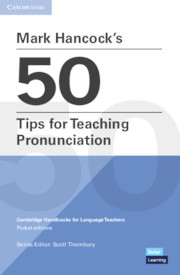C - How to Teach it
Published online by Cambridge University Press: 28 October 2023
Summary
The tips in this section are concerned with the techniques and methods we use in the classroom – the pedagogy. We will deal with such issues as presenting patterns, providing practice and giving feedback and correction.
How to teach pronunciation
33 Encourage a growth mindset
34 Build on what learners already know and feel
Presentation
35 Develop a class vocabulary
36 Be mindful about drilling
37 Focus on the physical
38 Encourage cognitive engagement
39 Raise awareness of patterns
Practice
40 Use communication activities
41 Use games and puzzles
42 Use drama and role-play
43 Use chants and rhymes
Feedback and assessment
44 Give informative feedback
45 Control your correction reflex
46 Assess learners’ progress
47 Help learners to deal with misunderstandings
Resources
48 Use resources for teachers
49 Make your own materials
50 Support learner autonomy
33 Encourage a growth mindset
Teachers and learners often have a mindset which says that pronunciation ability is something fixed – you’re either good at it or you aren’t. It's more constructive to believe that we’re all capable of learning if we make the effort.
When we see successful people, athletes for example, we see the results – the amazing things they can do – but not the process – the huge amount of effort behind their abilities. As a result, we are tempted to suppose that their success is a consequence of innate talent.
The belief that success is attributable to talent can lead to what psychologist Carol Dweck (see below) calls a fixed mindset. A person with this mindset believes that abilities are fixed: you either have the ability or you don’t. If you fail at something, it simply means you don't have that ability and you might as well give up. There's no point persisting with something you’re no good at because it will always end in failure.
Dweck contrasts the fixed mindset with what she calls a growth mindset. A person with this mindset thinks you can do just about anything if you put enough effort into it. For them, ability is not something fixed, but something which you can acquire through hard work. Trial and error are essential, so failures are a natural part of growth.
It's obvious which mindset will be more productive when it comes to pronunciation teaching and learning. Acquiring new articulation habits involves experimentation, and experiments are bound to have mixed results.
- Type
- Chapter
- Information
- Mark Hancock’s 50 Tips for Teaching Pronunciation , pp. 67 - 103Publisher: Cambridge University PressPrint publication year: 2020



